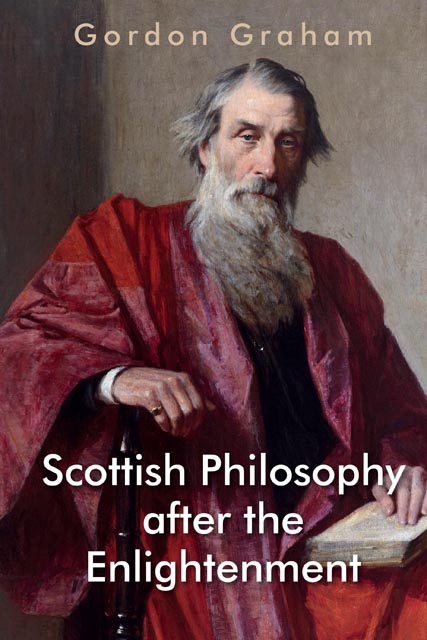Book contents
- Frontmatter
- Contents
- Preface and Acknowledgements
- Series Editor’s Introduction
- A Note on Women in Scottish Philosophy: Mrs Oliphant
- A Chronology of Scottish Philosophy after the Enlightenment
- 1 An Autobiographical Prologue
- 2 Sir William Hamilton and the Revitalisation of Scottish Philosophy
- 3 James Frederick Ferrier and the Course of Scottish Philosophy
- 4 Psychology and Moral Philosophy: Alexander Bain
- 5 Thomas Carlyle and the Philosophy of Rhetoric
- 6 Hegelianism and its Critics
- 7 Scottish Philosophy’s Progress
- 8 Religion, Evolution and Scottish Philosophy
- 9 The Gifford Lectures and the Re-affirmation of Theism: Alexander Campbell Fraser
- 10 The Culmination of Scottish Philosophy: A. S. Pringle-Pattison
- 11 John Macmurray and the Self as Agent
- Bibliography
- Index
3 - James Frederick Ferrier and the Course of Scottish Philosophy
Published online by Cambridge University Press: 07 June 2023
- Frontmatter
- Contents
- Preface and Acknowledgements
- Series Editor’s Introduction
- A Note on Women in Scottish Philosophy: Mrs Oliphant
- A Chronology of Scottish Philosophy after the Enlightenment
- 1 An Autobiographical Prologue
- 2 Sir William Hamilton and the Revitalisation of Scottish Philosophy
- 3 James Frederick Ferrier and the Course of Scottish Philosophy
- 4 Psychology and Moral Philosophy: Alexander Bain
- 5 Thomas Carlyle and the Philosophy of Rhetoric
- 6 Hegelianism and its Critics
- 7 Scottish Philosophy’s Progress
- 8 Religion, Evolution and Scottish Philosophy
- 9 The Gifford Lectures and the Re-affirmation of Theism: Alexander Campbell Fraser
- 10 The Culmination of Scottish Philosophy: A. S. Pringle-Pattison
- 11 John Macmurray and the Self as Agent
- Bibliography
- Index
Summary
I
In Part 4 of his highly acclaimed book The Democratic Intellect, George Elder Davie tells a dramatic and riveting story about the decline of Scottish Enlightenment philosophy in the course of the nineteenth century. A central role in the story is given to James Frederick Ferrier, Professor of Moral Philosophy at St Andrews from 1845 until his death in 1864. The Democratic Intellect was published in 1961, but Davie’s fascination with Ferrier, he tells us, had begun nearly thirty years earlier in 1936, when he first read about Ferrier in Torgny Segerstedt’s book The Problem of Knowledge in Scottish Philosophy. As a result, he found himself
caught up in the problem as to why this St Andrews Professor of Moral Philosophy … should be completely neglected in the philosophy classrooms of twentieth-century Scotland in favour of contemporaries or near contemporaries of his such as J. S. Mill or F. H. Bradley, who, whatever their merits, were in no wise his superiors in the quality of their philosophy … [and] … greatly inferior to him in the matter of anticipating and offering illumination on the principal innovations of twentieth-century thought. (Davie 1991: 89)
Davie’s estimate of Ferrier was not eccentric. Ferrier’s contemporary, Principal John Tulloch, a scholar of great distinction and philosophical acumen, concludes a long commemorative essay, ‘Professor Ferrier and the Higher Philosophy’, with this fine tribute.
[W]e feel warranted in saying of Professor Ferrier – whatever estimate may be formed of his philosophical system – that he is one of those thinkers who are likely to leave their mark upon the course of metaphysical opinion. There is life in all that came from his pen, – the life which springs out of intense conviction and of a rare, brilliant, and penetrating faculty of thought. (Tulloch 1884: 374)
Fifty years on, the estimate of Ferrier’s distinction had not diminished. In 1911, the University of St Andrews marked its 500th anniversary with a special publication – Votiva Tabella. The chapter on philosophy was written by G. F. Stout, then Professor of Logic and Metaphysics. He says this of Ferrier.
Ferrier stands out as the representative of St Andrews philosophy … the fifteen years he spent in St Andrews were the fruitful years of his life.
- Type
- Chapter
- Information
- Scottish Philosophy after the Enlightenment , pp. 48 - 74Publisher: Edinburgh University PressPrint publication year: 2022

